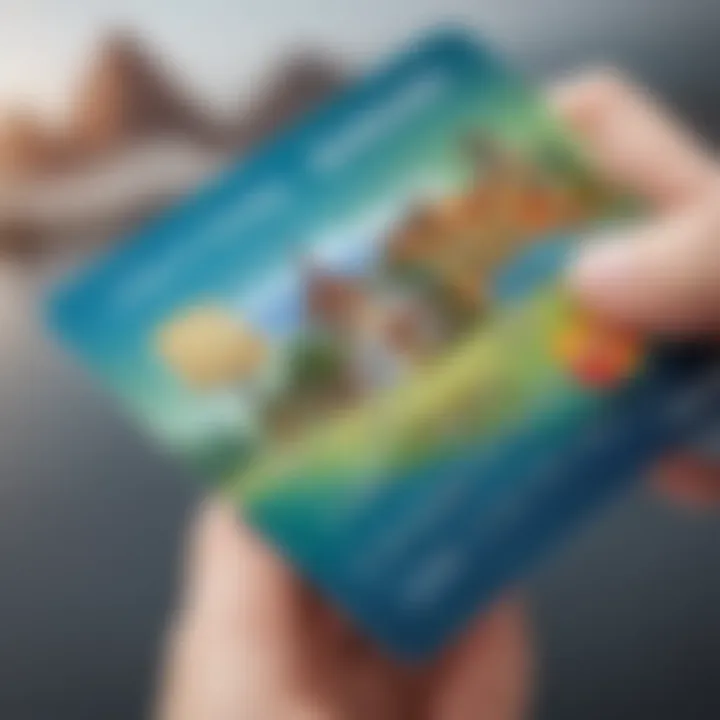Choosing the Best Cards for Global Travel


Intro
Traveling internationally is often an exhilarating experience, but it can quickly turn into a financial nightmare if you're not prepared. One of the main concerns for travelers concerns how to pay for goods and services abroad without incurring hefty charges or losing out on rewards. Understanding your options for credit and debit cards can shift your journey from stressful to smooth sailing.
Investment Dictionaries
The world of travel money is tangled with terms that can be confusing for even seasoned globetrotters. Before diving into the specifics of various cards, let's clarify some key financial terms you might encounter, as it greatly enhances your decision-making process.
Key Financial Terms
- Foreign Transaction Fee: This fee is charged by some card issuers when you make a purchase in a foreign currency or conduct a transaction outside your home country. It can range from 1% to 3% of the transaction amount.
- Rewards Program: Many cards offer rewards for spending, whether in the form of cash back, points, or travel miles. The perks can vary, so understanding how to maximize your benefit in a foreign setting is crucial.
- Chip-and-PIN Technology: A security feature that requires users to enter a PIN when making purchases. This is widely accepted in many countries and can be critical for avoiding fraud.
- Dynamic Currency Conversion: This is when the merchant offers to charge you in your home currency instead of the local currency. While it may seem convenient, it usually carries poor exchange rates.
Investment Strategies Explained
When selecting a card for international travel, it’s wise to consider a few strategies:
- Prioritize No Foreign Transaction Fees: Look for cards that don’t charge foreign transaction fees; this is a significant saving for frequent travelers.
- Focus on Rewards: Opt for cards that align with your travel habits. Are you a frequent flyer? Then maybe choose a card that offers airline miles.
- Choose Accessible Cards: Certain cards may not be widely accepted in all regions. Check acceptance networks like Visa or Mastercard, as they tend to have broad global reach.
Financial Product Comparisons
Understanding the various products available can help you make informed choices. It’s essential to compare specific metrics to see how each card stacks against another.
Performance Metrics Analysis
When evaluating cards, consider:
- Annual Fees: Some premium cards have high annual fees but offer substantial rewards. Is it worth it?
- Exchange Rates: The rates offered by your card issuer versus local rates can impact your travel budget.
- Travel Insurance: Certain travel cards come with built-in insurance for missed flights or lost luggage.
Cost-Benefit Evaluations
Evaluating the cost versus benefits will help you see the bigger picture:
- Cost: What are the annual fees, foreign transaction fees, and exchange rates?
- Benefit: What rewards do you get? Is travel insurance included? What�’s the customer service reputation?
While it may seem daunting to sift through dozens of options, taking the time to consider these factors can lead you to the optimal card for your travels, making financial sense as well as enhancing your travel experience. Knowledge is power, and a well-chosen card can enrich your journeys while keeping your finances in check.
Understanding the Basics of Travel Cards
Understanding travel cards is crucial for anyone who plans to journey beyond their home borders, whether for leisure or business. The financial implications of using the right card can make a significant difference in your overall travel experience. With a variety of options available, it becomes essential to grasp what makes a card suitable for international travel. This section sets the groundwork by examining what constitutes a travel card and the role of currency exchange rates.
What Constitutes a Travel Card
A travel card isn't just a piece of plastic that opens doors or makes purchases; it functions as a central hub for managing finances while overseas. Generally speaking, any debit, credit, or prepaid card can qualify as a travel card if it's designed to reduce costs and enhance convenience for travelers. However, what separates a travel card from a regular card revolves around a few key aspects:
- Foreign transaction fees: Many cards come with hefty fees that can add up. A good travel card should ideally have no foreign transaction fees.
- Customized rewards: Some cards offer bonus points or cashback on travel-related purchases like airfare, hotels, and dining.
- Emergency support: When you are miles away from home, having access to customer service that understands the needs of travelers can become invaluable.
- Global acceptance: A travel card should be widely accepted around the globe, preferably on the major networks such as Visa or Mastercard.
To put it simply, a travel card should feel like your financial lifeline while you're exploring foreign territories.
The Importance of Currency Exchange Rates
When you're abroad, every cent counts. Understanding currency exchange rates can either save you bucks or cost you dearly. If you've ever exchanged currency at an airport, you know it often comes with a sting. Banks and credit card companies frequently mark up the rates they offer compared to the base exchange rate. This markup can be sneaky, popping up at unexpected moments. So, knowing how to navigate this terrain can mean the world of difference.
- Real-time monitoring: Keeping an eye on the rates can help you pick the best time to make exchanges. There are apps available nowadays that can aid in tracking fluctuations.
- Understanding conversion fees: Look for a card that provides a fair conversion rate without additional fees. This indicates that they're transparent about what you're paying.
- Transaction timing: Sometimes, just waiting a day or two can yield a more favorable exchange rate. Patience, as they say, is a virtue, and in this case, it can also be financially rewarding.
"Knowing what constitutes a travel card and grasping the significance of currency exchange rates can empower you to make informed financial choices while traveling."
By laying this foundation, you position yourself to not just survive but thrive financially during your travels, maximizing your money while minimizing potential pitfalls.
Key Features to Consider
When casting your nets to fish for the best travel card, it’s critical to swim through the murky waters of various card features. Each card can bring its own set of utilities and drawbacks, so understanding the nuances is key to securing a favorable deal that won’t pin you down when you’re exploring new horizons. Let’s unravel the essential attributes you need to keep an eye on.
Foreign Transaction Fees
A lesser-known fact, but one surely essential for globetrotters: foreign transaction fees can feel like a leaky faucet draining your budget away. These fees, often ranging from 1% to 3% of the transaction, can add up quickly if you’re not careful. If you’re planning to spend a fortnight in Tokyo or a weekend in Lisbon, imagine coming home to find that you paid an additional 3% every time you grabbed a meal or bought a souvenir.
It’s not just the sticker shock; these fees can affect the overall value of a card. For instance, a card that claims to offer great rewards but slaps you with a hefty foreign transaction fee might not be the bargain it seems at first glance. Be sure to look for cards that wave goodbye to these fees, like the Chase Sapphire Preferred or the Capital One Venture. A little foresight can save you a boatload of cash, allowing you to spend those dollars on treats rather than unseen expenses.
Rewards and Benefits
The shiny allure of rewards programs cannot be overstated. Think of them as the cherry on top of your travel sundae. Many travel cards throw in bonuses such as points for every dollar spent, perks like priority boarding on flights, complimentary lounge access, or even travel credits.
When eyeing these rewards, it’s important to consider the card’s earning potential. For example, some cards offer higher returns on certain categories. If you’re a frequent flyer, a card that offers 3x points on airfare might be right up your alley. On the flip side, if accommodation is more your style, a card rewarding hotel stays could help you rack up points faster. Just be sure to read the fine print, as not all points are created equal. The redemption options matter too. Can you easily use points for flights, hotel stays, or even cash back?


Gift yourself the knowledge that some cards even offer welcome bonuses, which can take the form of hefty points or miles after meeting a minimum spend in the first few months. It’s like uncovering the hidden treasure when you least expect it.
Security Measures
In the realm of international travel, card security is your knight in shining armor. Picture this: you’re strolling through the vibrant streets of Paris, and suddenly your card gets swiped by an unscrupulous individual. A card equipped with robust security measures can be your saving grace. Features like EMV chip technology, which provides an encrypted connection with the card reader, go a long way in protecting your hard-earned cash.
Additionally, many cards now come with helpful notifications alerting you to suspicious activity. Imagine being notified in real-time about a transaction that wasn’t made by you while you’re sipping coffee at a little café. Having the ability to turn on and off your card via a mobile app can help ensure that your funds are safe while you’re abroad.
Furthermore, be on the lookout for cards that offer additional coverage, such as identity theft protection or purchase fraud protection. The peace of mind these features offer can make all the difference as you wander the globe.
"A good travel card is not just about the benefits but also the safeguards in place to protect your peace of mind."
By keeping these key features in consideration, you ensure that your travel card doesn’t just work but works hard for you, enhancing your global experiences without adding undue stress to your budget.
Types of Cards Suitable for Travel
When setting out on an international journey, selecting the right card can make a world of difference. Simply put, choosing the appropriate travel card can save you a buck or two while ensuring that your financial needs are met during your travels. Different types of cards serve varied purposes, each with its unique advantages and drawbacks. Understanding these nuances is key to making informed decisions.
Credit Cards
Overview of Credit Card Benefits
Credit cards are often lauded for their myriad benefits, especially when it comes to international travel. One notable aspect is the potential for earning rewards. Many travel credit cards allow users to rack up points or miles that can later be redeemed for flights, hotel stays, or even car rentals. This feature makes them particularly appealing for frequent travellers or those aiming to maximize their travel experience on a budget.
Another perk revolves around travel insurance. Often included with travel credit cards, this coverage can protect against a range of mishaps such as trip cancellations, lost luggage, or even medical emergencies abroad. The best credit cards have no foreign transaction fees, which is another tick in their favour, easing the burden of extra costs while spending overseas.
However, it’s important to note that credit cards also run the risk of accruing high-interest debt if not managed judiciously. Keeping track of spending and paying balances promptly can help to avoid this pitfall.
Notable Travel Credit Card Options
There are several standout travel credit cards that deserve a mention. Cards like the Chase Sapphire Preferred, renowned for its flexible rewards program, allow users to transfer points to various airline loyalty programs. Then, there's the American Express Platinum, celebrated for its generous travel benefits including access to exclusive lounges and comprehensive travel insurance.
What sets these cards apart is their strong rewards structures. For example, both cards typically offer multiple points per dollar spent on travel-related purchases. However, they may come with higher annual fees, so potential applicants should weigh the benefits against the costs to determine if it's worth it.
Debit Cards
Benefits of Using Debit Cards Abroad
Debit cards are another practical option for international travelers. One hallmark feature is direct access to your own funds. Unlike credit cards, debit cards withdraw money straight from your bank account, which can help travelers keep better track of their spending. This immediate connection to your funds often means no interest charges or the risk of overspending that comes with credit cards.
Additionally, many debit cards come with low–or even zero–foreign transaction fees. This is an important consideration for those who wish to stretch their dollars further while navigating foreign expenses. Generally, using a debit card can provide a sense of financial security, especially for those who prefer not to carry cash.
Although using a debit card abroad has its benefits, it’s essential to be cautious. Not all debit cards come with the same level of fraud protection as credit cards, potentially leaving you more vulnerable in certain situations.
Key Debit Card Features
When examining debit cards suitable for international use, a few key features stand out. Pay particular attention to cards that offer comprehensive fraud protection, allowing users to feel secure when dealing with unknown ATMs or foreign merchants. Also, cards that allow free ATM withdrawals provide significant value by minimizing unnecessary fees.
Some popular examples include the Charles Schwab Debit Card and the Capital One 360 Checking Card. Both options deliver excellent foreign fee structures, but they may have specific withdrawal limits or requirements, so reading the fine print before setting off on your travels is wise.
Prepaid Cards
Exploring the Use of Prepaid Cards
Prepaid cards stand as yet another alternative in the international card mix. By loading a specified amount onto the card before traveling, you can control how much you spend. This aspect serves as a form of budgeting discipline, which is beneficial for those who tend to overspend while abroad.
They're also helpful as a backup option in case of emergencies, providing peace of mind that there’s a reserved fund if matters don’t go according to plan. Plus, the risk of running into debt is virtually non-existent since you can only spend what you've loaded onto the card.
Nevertheless, users should be aware of the potential fees associated with prepaid cards, like activation fees or monthly service fees that can chip away at your travel budget.
How to Load and Utilize Prepaid Cards
Loading and utilizing prepaid cards is often a straightforward process. Users can typically load funds via direct deposit, bank transfer, or through retail locations. Many prepaid cards come with mobile apps, allowing for easy loading and balance tracking right from your smartphone.
The convenience factor makes them particularly travel-friendly. However, just like with any other financial instrument, it's wise to read the terms and conditions. Customers should familiarize themselves with the fees, limits, and potential restrictions on international use in order to ensure smooth sailing during their travels.
Utilizing a blend of these card types can provide the flexibility and security needed while venturing into different countries, as each has its strengths geared toward various travel circumstances.
Selecting the most suitable card for international travel requires consideration of personal spending habits, travel frequency, and preferred benefits. The right card can facilitate easy transactions, hedging against unfavorable exchange rates, while also enhancing travel rewards. By weighing the advantages and disadvantages of credit, debit, and prepaid cards, you'll be in a much better position to optimize your financial strategy abroad.
Comparing Popular Travel Card Options
When it comes to planning a trip abroad, many factors can influence your overall experience, especially your choice of travel card. Comparing popular travel card options is vital because it allows you as a traveler to weigh the pros and cons of each card type. This knowledge can be the difference between enjoying a hassle-free journey and being hit by unexpected fees or dull rewards.


Understanding how different cards stack up against one another helps in making the best financial decision while traveling. Some travelers lean toward travel credit cards, which often come with alluring rewards and benefits, while others might prefer the straightforward nature of debit cards. Each option has its own features that can shape your travel demeanor, letting you either seize opportunities or run into setbacks. Considerations include fees, benefits like travel insurance, and any partner networks that might give you exclusive rewards abroad.
Top Travel Credit Cards
Travel credit cards often shine for their excellent rewards structures tailored to travelers' needs. Cards like the Chase Sapphire Preferred or the Capital One Venture One stand out not only for their points systems but also for additional benefits such as trip insurance and no foreign transaction fees. Such cards typically offer the following:
- Sign-up bonuses: Many credit cards entice new members with generous bonus offers when spending thresholds are met early on. This might mean a free flight or hotel stays!
- Points on travel categories: Credit cards often award extra points on flights, hotels, and dining, making those expenditures work for you.
- Travel toolkits: Some credit cards provide helpful travel tools. For instance, the ability to use your points flexibly for travel or transfer them to loyalty programs can maximize their value.
It's worth noting that the right choice also depends on your spending habits. If you plan to use the card frequently during your travels, find a card that aligns with your spending patterns.
Leading Travel Debit Cards
While credit cards take the spotlight, travel debit cards shouldn’t be overlooked. They can be a more subtle approach to managing your finances abroad—keeping your spending in check while avoiding debt accumulation. Cards like the Charles Schwab Debit Card or the American Express Serve card are reputable options.
Here are notable benefits of travel debit cards:
- Direct access to funds: Your money is directly withdrawn from your checking account. This can help keep spending within limits without the temptation of overusing credit.
- Low or no fees: Many travel debit cards do not charge foreign transaction fees, which is essential when using your card overseas.
- Convenience of use: Paying with debit cards is often easier in local markets or for everyday purchases. If you've got cash instead of card, it's one less worry about credit limits or exceeding your budget.
"A well-planned trip can lead to new experiences and unexpected adventures, all without the burden of financial pitfalls."
Special Considerations for Travelers
When it comes to international travel, there's a heap of factors that can affect how well you manage your finances abroad. Understanding the nuances tied to the types of cards you use is crucial. Each country has its own set of rules, and knowing them can save you a world of trouble. This section focuses on special considerations that travelers often overlook but are necessary for making the most out of your travel cards.
Managing Card Limits
First off, card limits can be a tricky subject. Your travel card might come with daily withdrawal limits or spending caps. These limits are set for various reasons, including fraud prevention and regulatory compliance. However, if you’re roaming around in a country with a high cost of living, like Switzerland or Norway, you could hit those limits before you even know it.
To manage this effectively, it’s wise to communicate with your bank or card issuer before your trip. Ask them about limits and check if they could increase them temporarily if needed. Some banks have flexible policies that allow for adjustments if you inform them in advance. Also, keep an eye on your spending, ideally by using a finance app that gives you real-time updates. This way, you can ensure that you’re not left high and dry when you need cash the most.
Understanding Local Regulations
When traveling abroad, each destination may have its own set of regulations concerning currency use and card transactions. Knowing these guidelines is paramount to avoid surprises. Not only do you want to use your card effectively, but you also need to comply with local laws to avoid any unnecessary hassle.
Restrictions on Currency Withdrawals
Restrictions on currency withdrawals can vary widely between countries and even banks. In some places, you might find banks imposing daily limits or fees for withdrawing currency that can really spike your expenses. For instance, while in the Eurozone, some banks will charge you if you exceed a certain number of ATM withdrawals per week.
The crux is to be proactive. Before heading out, make sure to ask your bank about these restrictions, especially if you plan on withdrawing large sums or making frequent trips to ATMs. A little foresight can help you dodge unnecessary withdrawal fees and help your budget stay intact.
Tax Implications for Non-residents
Another thing that’s easy to overlook is the tax implications for non-residents. Depending on the country, you might have to pay taxes on funds you withdraw or spend while using your travel card. This varies not only by country but also by the specific agreement your card issuer has established with local banks.
A key point to note is that some countries impose a tax on foreign debit and credit transactions. Depending on the currency exchange rate at the time, these taxes can add up quickly when making purchases or taking cash out. It's crucial to do your research. Check out government websites or local financial forums that can provide insights into tax regulations for travelers.
In short, understanding these unique features of currency restrictions and tax implications allows you to navigate financial transactions during your travels efficiently. Being informed enables you to make better choices, ultimately leading to a smoother travel experience.
"Knowledge is power, especially when it comes to managing your finances abroad."
Stay sharp, be well-informed, and enjoy your globetrotting adventures!
Strategies for Effective Card Usage Abroad
Navigating the financial landscape while traveling internationally requires careful planning and a strong understanding of the tools at your disposal. The right strategies for using your card can mean the difference between a seamless travel experience and a financial headache. Focusing on card management not only helps you save money through minimizing fees but also enhances your overall travel comfort and security. With so many cards and options available, it's crucial to align your approach with your spending habits and destination specifics.
Using ATMs Wisely
When it comes to accessing cash abroad, your choice of ATMs can pull ranks on your travel experience. First and foremost, tap into networks that offer lower fees or no fees at all. Many large banks have partnerships worldwide, enabling cardholders to withdraw funds without incurring hefty charges. Avoid using independent or less-known ATMs, as these often have unpredictable fees and questionable security.
Consider the following tips when approaching ATM withdrawals:
- Select bank ATMs: Whenever possible, choose ATMs associated with well-known financial institutions. This could save you several dollars per withdrawal.
- Withdraw larger amounts: Rather than making multiple small withdrawals, consider taking out a larger sum of money in one go. This reduces the transaction frequency and may help you avoid multiple fees.
- Be cautious with currency conversion: When given the option to withdraw in your home currency or the local currency, opt for the local currency to dodge you conversion fees that the ATM might impose.
"A penny saved is a penny earned."
Your cash management while traveling can indeed contribute to significant savings.
Optimal Payment Methods
Choosing the best payment method when making purchases abroad can have equally significant repercussions as choosing the right ATM. Not every payment method is created equal, especially when it comes to fees, convenience, and security. Here are some payment methods to consider:
- Credit Cards: Utilize credit cards with no foreign transaction fees. These cards often provide best exchange rates and additional benefits like travel insurance and reward points.
- Debit Cards: These can be a quick alternative but tread lightly—their fees vary significantly by bank. Some banks allow for fee-free international purchases when using their associated debit cards.
- Mobile Payments: Payment apps like Apple Pay or Google Pay can be convenient, but not every merchant may accept them. This method could be ideal for smaller purchases, especially in urban areas.
- Travel Prepaid Cards: If you prefer budgeting, travel prepaid cards are yet another option. Load a specific amount and stick to that. These usually help in keeping your expenses in check but often come with loading fees.
- Look for cards tied to major credit card networks like Visa or Mastercard, as they offer broader acceptance and usually more competitive rates.


- Many banks offer a debit card that compensates for international withdrawal fees or allows you to redeem points just like credit cards.
- Make sure to add your travel prep's cards to the app before departing.
To ensure smooth transactions, always inform your bank of your travel plans. This will avert any hiccups in account activity that could trigger fraud alerts or limits on your card usage. It also prepares them for any potential changes in your spending behavior abroad.
In summary, maximizing card benefits while sensibly navigating ATMs and payment options is key to a great travel experience. With the right strategies in place, managing your finances abroad can be a walk in the park.
Potential Pitfalls to Avoid
Navigating the world of travel cards can feel like walking on a tightrope; a misstep could cost you. One of the vital aspects of choosing an optimal card for international travel is understanding the potential pitfalls that could arise. It’s not just about which card to pick, but being aware of pitfalls that can compromise your experience abroad. Knowing what challenges to sidestep can help you make more informed decisions, ultimately saving you time, money, and unnecessary headaches.
Hidden Fees and Charges
When you least expect it, hidden fees can pop up like unwanted weeds in a garden. Travelers might find themselves grappling with charges they weren’t aware of, which could quickly add up. These fees can stem from various sources such as currency conversion, ATM withdrawals, or even annual fees masquerading as low or no-fee accounts.
Consider the following factors when evaluating your travel card:
- Foreign Transaction Fees: While some cards blissfully eliminate this fee, others can hit you with percentages that range from 1% to 3% every time you make a purchase in a different currency. This could take a bite out of your travel budget.
- ATM Fees: Cash withdrawal may be necessary during your trip, but ATM fees vary significantly. Some banks charge a fee for using a foreign ATM. Look for cards that either reimburse these fees or offer partnerships with global ATM networks.
- Dynamic Currency Conversion: Ever seen the option to pay in your home currency while abroad? Tempting as it is, exercising this option often comes with a higher exchange rate. It’s usually best to stick with the local currency.
To shield yourself from these sneak attacks on your wallet, scrutinize the card’s terms. Reading the fine print can seem tedious, but it’s akin to putting on sunscreen before hitting the beach; a little precaution goes a long way.
Fraud Prevention and Protection
With great freedom comes great responsibility, and international travel opens up a pandora’s box when it comes to fraud risks. Hackers and scammers are lurking like wolves in sheep’s clothing, ready to take advantage of unsuspecting travelers. Therefore, ensuring that you have robust fraud prevention and protection measures in place is non-negotiable.
Here are some points to consider:
- EMV Chips: Ensure your card is equipped with an EMV chip, as they provide stronger security protocols compared to magnetic stripes. Many countries require the use of chip-enabled cards.
- Alerts and Notifications: Setting up transaction alerts can help you stay on top of your spending. If a transaction doesn’t seem right, you'll have a heads up and can act quickly.
- Travel Notifications: Notify your bank about your travel plans to avoid potential card blocks when foreign charges appear, which is notorious for throwing a wrench in your plans.
- Monitoring Services: Some cards come with additional services that monitor your account for suspicious activity. While not foolproof, they add another layer of security.
In closing, the importance of understanding hidden fees and fraud protection cannot be overstated in your journey.
"An ounce of prevention is worth a pound of cure." - Benjamin Franklin
While you can’t avoid every pitfall, arming yourself with knowledge ensures your next travel adventure is as smooth as silk.
Making the Most of Travel Card Benefits
When it comes to traversing different countries and immersing oneself in diverse cultures, the right travel card can be a game changer. Leveraging travel card benefits isn't merely about convenience; it’s about unlocking potential savings and maximizing your overall travel experience. With the labyrinth of fees, rewards, and insurances, ensuring that you utilize these cards effectively allows you to keep your finances in check while you explore locales far from home.
Maximizing Reward Programs
Reward programs stand as the crown jewel of many travel cards; they’re designed to entice travelers by providing points or cash back for every dollar spent. Each program varies, painting a diverse landscape of benefits. The trick lies in understanding how to extract the maximum from these offerings.
- Know your spending habits: Take a moment to assess where you tend to spend most—be it dining, shopping, or lodging. This knowledge can help you select cards that provide more points in those categories.
- Utilize sign-up bonuses: Many cards offer substantial sign-up bonuses that can go a long way. For instance, a card might grant you bonus points if you spend a certain amount within the first few months. Make sure to read the fine print and strategize your spending accordingly.
- Combine points: If you have more than one travel-related card, check if you can combine points from different programs. This can lead to quicker points accumulation, pushing you closer to those luxury hotel stays or first-class flights.
- Stay loyal to specific brands: Some airlines or hotel chains reward loyal customers heavily. By sticking to one or two brands for your travels, you can rack up points faster and enjoy elite status perks such as upgrades or bonus rewards.
By employing these strategies, every dinner out or souvenir purchase can be a stepping stone to your next grand adventure.
Leveraging Travel Insurance
Diving into the intricate world of travel insurance can feel as daunting as booking that first international flight. However, understanding how to leverage the insurance benefits that come with your travel cards can be crucial in safeguarding your journey.
First off, check if your travel card includes any complimentary travel insurance, as that can save you money and give you peace of mind. Some essential coverage options often provided include:
- Trip cancellations or interruptions: If an unexpected event causes you to cancel or cut short your trip, this coverage can reimburse non-refundable costs.
- Medical emergencies: Many travel cards offer medical insurance coverage while you are abroad. This can be vital, especially in countries where healthcare costs skyrocket.
- Lost luggage: The agony of losing your bags is a traveler’s nightmare, but with the right insurance, you can claim compensation.
In addition, read through the terms thoroughly to ensure you're aware of limits or claims processes. Sometimes, insurance won't cover certain high-risk activities, so it’s best to prepare accordingly. Keeping all your receipts and documentation can simplify any claims when things don’t go as planned.
Always take a moment to familiarize yourself with the benefits offered, as knowing how to tap into these can cushion the unpredictable nature of travel.
By digging deep into rewards programs and wisely utilizing travel insurance, travelers not only enhance their trip but travel with the safety net they need. Embracing these strategies can lead to a seamless journey, enabling you to keep your worries at bay while collecting delightful memories.
The End
Wrapping up this exploration of travel cards, it's clear that the decision involves more than just picking a shiny option. The right card can enhance your travels in numerous ways, influencing costs, security, and even the experience itself.
Summarizing Key Insights
To recap, travelers should focus on several key elements:
- Foreign Transaction Fees: Always check if the card charges for transactions made in a different currency. These fees can quickly pile up and dampen your travel budget.
- Rewards Programs: Choose cards that offer travel-friendly rewards, be it points, miles, or cash back, specifically geared towards travel likes flights, hotels, or car rentals. Every little benefit adds a sprinkle of joy to your journeys.
- Security Measures: Given that the world can be unpredictable, ensuring your card has robust security features can save you a world of hassle. This includes fraud monitoring and the option to freeze your card instantly.
In addition, understanding local regulations and managing card limits is a crucial part of making the most of your card while abroad. These insights transform the experience from stressful transactions to casual spending, allowing you to savor the sights and sounds of your destinations, free from financial worries.
Encouragement for Informed Decisions
As you prep for your next adventure, remember that knowledge is power. If you approach your card selection with a clear view of your travel habits and essentials, you can avoid pitfalls and fully reap the rewards. Arm yourself with information, compare different cards on the market, and perhaps read a few user reviews or join a discussion on platforms like Reddit for realistic insights.
Ultimately, informed decisions mean more than just saving a few bucks; they lead to richer experiences and smoother travels, allowing you to focus on living in the moment instead of worrying about your finances. Choose wisely; your journeys deserve it.







